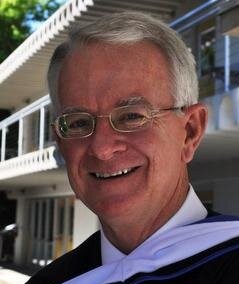
Bill Cox
Citation
Written by Fr. Michael Sweeney, OP, on May 2012 at the Induction in the College of Fellows
William Cox, husband and father, health care reformer, champion of the lay apostolate, loyal son of the Church, the Dominican School of Philosophy and Theology salutes you.
In his Address to the Leaders in Catholic Health Care, on the occasion of his apostolic visit to the United States in 1987, Bl. John Paul II referred to the health care ministry as “…one of the most vital apostolates of the ecclesial community and one of the most significant services which the Catholic Church offers to society in the name of Jesus Christ (September 14, 1987, 1). He went on to state that, “in the exercise of your professional activities you have a magnificent opportunity, by your constant witness to moral truth, to contribute to the formation of society's moral vision. …Your service to the sick enables you with great credibility to proclaim to the world the demands and values of the Gospel of Jesus Christ and to foster hope and renewal of heart” (6).
In the more than thirty years of your engagement in Catholic health care you have insisted upon the significance of this apostolate both as a truly ecclesial work and as an instrument for health care reform in the United States. Having served as Executive Vice-President of the Catholic Health Association in Washington, D.C. and now as President and CEO of the Alliance of Catholic Health Care in Sacramento, California you have worked to give definition to the mission of Catholic health care and, thereby, to guarantee its Catholic character.
In 2002 you helped to found the Ministry Leadership Center whose purpose is to offer an experience-based theological and spiritual formation for senior managers. In your own words, “…future Catholic health care organizations will not be able to justly claim the name Catholic if an understanding of mission does not exist at every level of the organization; and mission cannot survive if Catholic healthcare organizations do not find a way to retrieve it, renew it, maintain, and pass it on.”
You have insisted that Catholic healthcare must manifest a preferential option for the poor and have emphasized the dignity of the person as defining characteristics of healthcare as an apostolate; “for patients, the Catholic approach to healthcare can mean the difference between an experience of hope and healing and an experience of isolating, mechanistic cure.” You have enabled Catholic systems to develop and adopt a statewide model policy on hospital billing and collection practices for low income patients, enabled Catholic systems to develop a model policy on statewide healthcare reform and have helped to defeat legislation that would have required Catholic hospitals to provide services inconsistent with Catholic moral teaching.
You continue to exercise national as well as statewide leadership in Catholic healthcare, serving as board chair of Providence Hospital in Washington, DC, and as a member of the Alliance for Advancing Not-For-Profit Healthcare. You are a lay member of the United States Catholic Conference's Doctrine Committee's Subcommittee on Health Care, and the California Catholic Conference's Committee on Religious Liberty. In 2012, you accepted appointment to Providence Ministries that oversees Providence Health and Services.
In your advocacy of Catholic health care you have emphasized that “… A significant portion of the American public is seeking meaning and purpose beyond the limitations of the dominant secular culture” and that “the Church's presence in healthcare is especially important in a culture that is prone to diminish human dignity by reducing human life and human relationships to the status of a commodity.” It is the declared mission of our school to place the Catholic tradition into dialogue with contemporary culture in order that we may understand more deeply what we have received and how we may best represent it to our contemporaries. For this reason we are delighted that you have consented to join with us in this work.
Therefore, as an expression of our esteem and gratitude, and in virtue of the authority invested in me by the Board of Trustees of the Dominican School of Philosophy and Theology, I am privileged to bestow upon you, Willliam Cox, the degree Doctor of Humane Letters honoris causa, and to name you a Fellow of the School.
